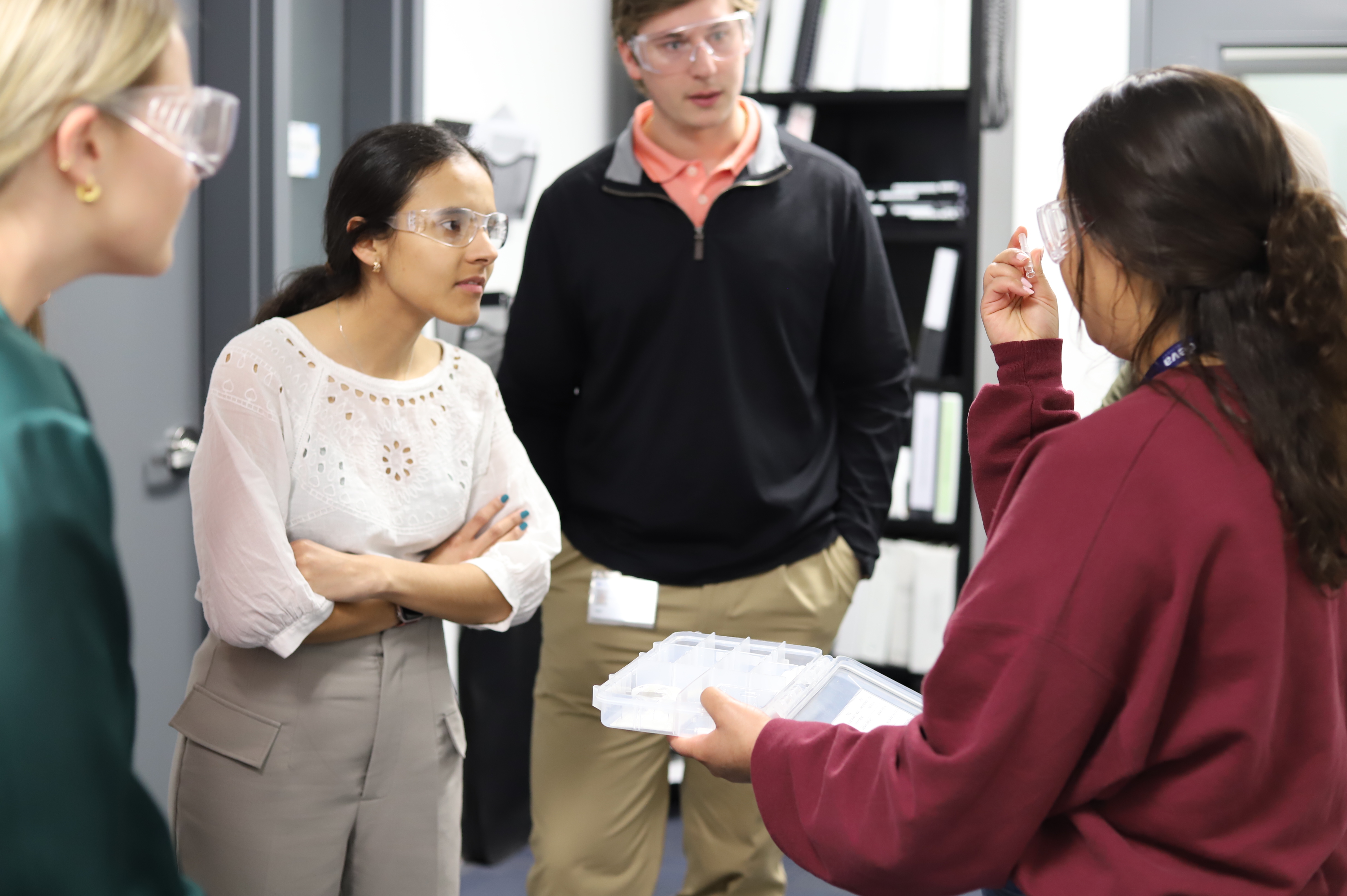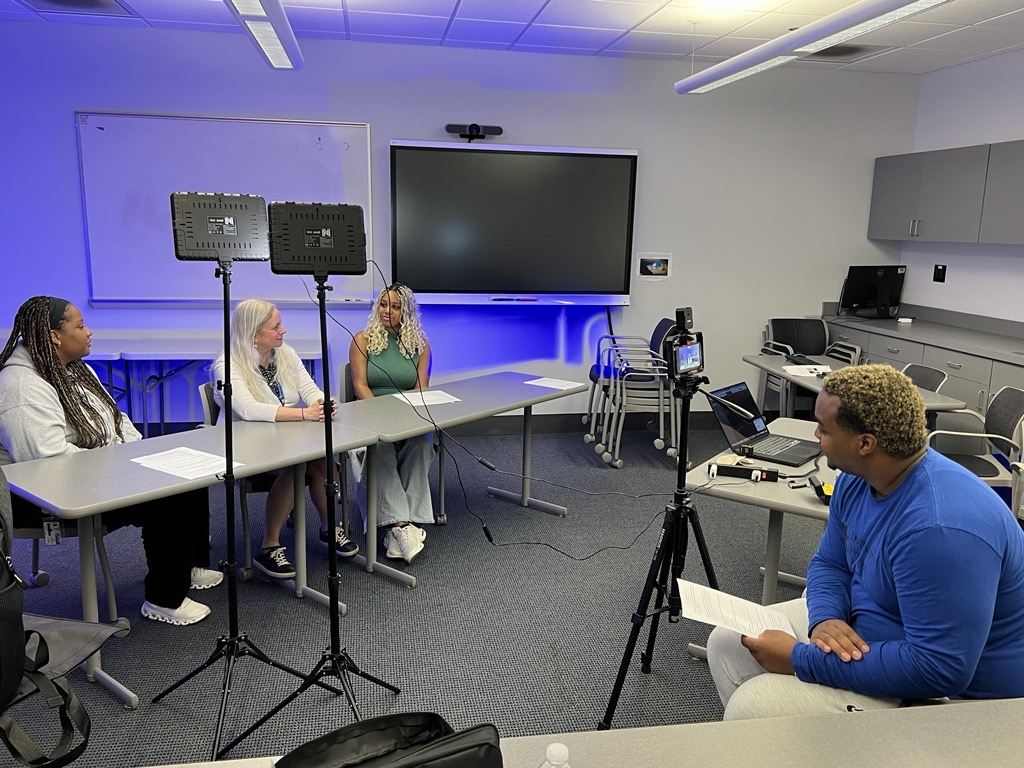The UK College of Medicine Integrated Biomedical Sciences (IBS) is an undifferentiated first-year core curriculum that serves as the entry point for a doctoral program in one of six basic science departments. All incoming doctoral students take the same courses during their first year and complete a variety of lab rotations before choosing their area of focus.
In 2024, under the leadership of Beth Garvy, PhD, senior associate dean for biomedical education, the Office of Biomedical Education launched a new innovative initiative aimed at enriching the education and career trajectories of its first-year students—a summer internship program.
Following their IBS year, 19 students completed four-week summer internships relevant to their unique scholarly interests. Diane Lally, PhD, director of trainee development for the Office of Biomedical Education, was integral to the development of the internship program. She worked closely with students to understand their interests and find diverse experiential learning opportunities across 10 partnering sites at UK and within the community.
“This internship happens at the end of that year, just before they join their new labs,” noted Dr. Lally. “It helps them refine their career goals before starting the next step of their training.”
The structure of the internship program is managed in collaboration with UK’s Stuckert Career Center, ensuring comprehensive support for students. The program provides a holistic framework for personal and professional development, including structured assignments, regular reflections, and mentorship and networking opportunities.
The program not only exposes students to diverse career paths but also fosters essential skills like communication, critical for professional success. "Soft skills were a major learning outcome for our students, skills they don’t necessarily get to practice in their regular coursework," shared Dr. Lally.
After earning her undergraduate and master’s degrees in biomedicine in Brazil, Marilia Martins Manta was drawn to the UK College of Medicine for its unique IBS year, grateful that it “allows students to rotate through different departments before choosing a degree focus.” Manta spent her summer gaining insights into pharmaceutical development at Kindeva Drug Delivery, a contract development and manufacturing organization that works on the fabrication of important and life-saving products at UK’s Coldstream Research Campus.
"Heading into the last week of my internship I can say for certain that it was very important for my decision of career choice," shared Manta. “I haven’t decided if I want to pursue industry or academia just yet, but I know I want to keep doing bench research.”
Susana Munoz Gil, originally from Colombia, also delved into industry dynamics through an internship at TruDiagnostic. "I was able to experience what a day in industry might look like," Munoz reflects, "and was fascinated by the experiments I conducted. It felt like magic." Her internship at TruDiagnostic not only provided technical insights but also affirmed her passion for scientific exploration in an industry setting.
For Samantha Radomski, the internship was a “transformative experience.” She spent her summer working closely with Hollie Swanson, PhD, professor of pharmacology and nutritional sciences, assisting with the Summer Undergraduate Research in Environmental Science (SURES) program. Radomski’s involvement extended beyond routine tasks— she led workshops and conducted informational interviews with participants, embodying the internship’s goal of hands-on learning and experiential professional development.
“This internship has already played a large role in shaping my career goals and affirming what I will find fulfilling as a career," shared Radomski.
Joshua Moses echoes similar sentiments, having “found his niche” in science communication through an internship with the college’s Office of Strategic Communications. "The biggest impact that this internship has had on me is that it showed me that I can do this career,” said Moses. “And I am pretty good at it."
“Placing a biomedical PhD student on a marketing and communications team might seem unconventional, but Josh’s internship underscores the importance of scientists enhancing their communication skills to talk about the impactful work they’re doing,” shared Jorge Castorena, director of marketing. “It was inspiring to see how this opportunity not only helped Josh to grow, but also how our team benefited from his perspective as a scientist.”
For Radomski, the timing of the experience could not have been better. “This internship has been beneficial in both content and timing,” noted Radomski. “Because it’s at the end of my first year, I feel I have a renewed sense of confidence in my goals and am more committed to taking advantage of opportunities available.”
As the internship program continues to evolve, Dr. Lally and her team remain committed to enhancing students' readiness for what lies ahead. "Our goal is for students to feel prepared both academically and professionally upon graduation," shared Dr. Lally, underscoring the office’s broader mission of nurturing well-rounded biomedical professionals.
“This internship is just one piece of our career exploration efforts,” said Dr. Lally. “We provide year-round support through seminars, research days, as well as more practical lessons around updating CVs and LinkedIn profiles.”
Through mentorship, exposure to diverse career pathways, and practical experiences like the internship, IBS students are equipped with invaluable skills and insights, empowering them to chart their paths with confidence and purpose in the growing field of biomedical sciences.

